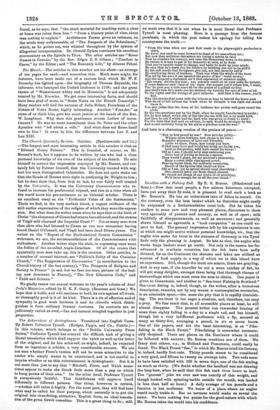In this volume, which belongs to the "Dublin University Press
Series," Professor Tyrrell has essayed the difficult task of giving a literal translation which shall suggest the spirit as well as the letter of the original, and he has achieved, as might, indeed, be expected from so ingenious a scholar, a very considerable success. We are not sure whether Frere's version will not be more attractive to the reader who simply wants to be entertained, and is not careful to inquire whether or no this entertainment is Aristophanic. But it is not more than just to say that " Mitchell, Frere, and Walsh some- times appear to make the Greek little more than a peg on which to hang poems of their own." On the other hand, Professor Tyrrell is scrupulously faithful. This faithfulness will approve itself differently to different persons. One thing, howevert is certain, —scholars will value it highly. For the most part, they will find here what may be called for their purpose, which naturally is to put the original into close-fitting, attractive, English form, an ideal transla- tion of the great Greek comedian. This is a great thing to do ; still, we must own that it is not when he is most literal that Professor Tyrrell is most pleasing. Here is a passage from the famous parabasis, in which the poet makes his apology for telling his countrymen the truth
"From the time when our poet first made in the playwright's profession a.
start, He never was used to come forward to boast of his marvellous art ; But now that malicious detractors are trying a notion to raise That he slanders his country, and runs the Democracy down in his plays, He thinks it is best to put in his demurrer at once, as he finds That you're equally ready to change, and hasty to make up your minds. He says that he's made you his debtors by teaching you not to be gull'd
By the soft words that foreigners give you, nor into security loUd
By swallowing doses of bunkum. Time was when the whole of the town Was led by the nose if one spouted the praise of her' violet crown,' And the moment a diplomate air'd that expression of mystical might, 'The crown' did the bns.ness ; you scarcely could sit on year seats for delight.
If some flatterer said 'laud of oil' there was nought you'd refuse him, I ween, The' he gave you a title more fit for the praise of a potted sardine.
And that's how he's made you his debtors—by turning the eyes of your nind To the rights and the wrongs of your subjects. And that is the reason, you'll find, Why the envoys that come with the tribute so long to behold the brave poet Who dared to tell Athens the truth when he thought it was right she should know it.
You may judge that the fame of his boldness has pretty well gone round the globe By the two questions put by the Shah, when he sought Lacedaemon to probe; For he first asked, which side of the two the sea with her n tvy could hold,
And then he ased which had the bard who was given FO freely t, scold ;
For the state that had such an adviser, he said, would be stronger by far, And would certainly bring by his aid to a glorious issue the war."
And here is a charming version of the praises of peace :— " SaW ye how proud he was ? Now he's for jollity— Witness those feathers, how choice is his fare I Beautiful playmate of Love and Frivolity, Little we knew, Peace, how lovely you were. 0 that some Love-god would but bring me facing you, Love in the picture, with buds round his brows Old as I am, I should ne'er stop embracing you, Ne'er tire of kissing so buxom a spouse. Then would I plant, for my mistress's pleasuring, Many a sweet little vine-sprout a-row, Rear,ng beside them, for motherly treasuring, Shoots of the fig-tree that tenderest blow. Old as I am, yet no sprout should want cherishing ; Olive-branch laden our farm should abound. We should not dream of our cruise of oil perishing, We'd have enough for us all the year round."


































 Previous page
Previous page